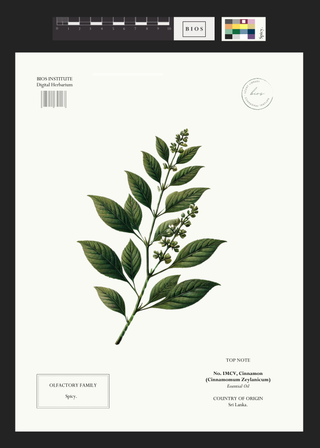

Cinnamon (Cinnamomum zeylanicum), also known as Ceylon cinnamon or true cinnamon, is native to Sri Lanka (formerly known as Ceylon). The name "Ceylon cinnamon" is derived from the former name of Sri Lanka. Sri Lanka is one of the main producers and exporters of Ceylon cinnamon, and the spice has been an integral part of the country's history, culture, and economy for centuries. The inner bark of the Cinnamomum zeylanicum tree is harvested and processed to produce the well-known and highly prized cinnamon spice, which is used in cooking, baking, and various culinary applications, as well as in traditional medicine, herbal remedies, and perfumery. Our cinnamon is sourced from Sri Lanka.
Cinnamon has a distinct scent characterized by its warm and spicy notes. It exudes a comforting and inviting aroma with hints of sweetness. In perfumery, cinnamon is often used to create warm, oriental, and gourmand fragrances.
Cinnamon is a top note found in our Spicy family. It has a long-lasting aroma that helps anchor and support the other fragrance ingredients. Its presence can add depth, complexity, and a touch of sensuality to a fragrance composition.
Cinnamon blends well with various fragrance ingredients, enhancing their character and creating unique olfactory combinations. It pairs beautifully with notes such as vanilla, clove, patchouli, citrus, and woody elements, creating rich and alluring scent profiles.
Overall, cinnamon adds a warm and spicy element to perfumes, creating an inviting and sensual experience. Its cultural symbolism and historical significance make it a cherished ingredient in perfumery, evoking a sense of tradition, luxury, and allure.
Sri Lanka, being the native home of Cinnamomum zeylanicum, was a major source of cinnamon during ancient times. Traders from various regions sought this valuable spice, and it was transported over long distances to reach the markets of ancient Egypt, Greece, and Rome.
In ancient Egypt, cinnamon was used in various religious rituals, embalming processes, and as a perfume. In ancient Greece and Rome, it was a highly prized and expensive spice used in culinary preparations, perfumes, and medicines. Its use was often associated with luxury and status.
The trade in cinnamon from Sri Lanka to these ancient civilizations played a significant role in the exchange of goods, cultures, and knowledge between regions, contributing to the interconnectedness of the ancient world.
Cinnamon is widely used in culinary traditions around the world. It adds a warm and sweet flavor to dishes and is commonly used in both savory and sweet recipes. In many cultures, cinnamon is associated with comfort, home-cooked meals, and festive occasions. It is often used in holiday recipes and traditional desserts.
Cinnamon has been used in traditional medicine systems, such as Ayurveda and Traditional Chinese Medicine, for its potential health benefits. It is believed to have anti-inflammatory, antibacterial, and digestive properties. In some cultures, cinnamon is used to alleviate symptoms of colds and coughs, aid digestion, and promote overall well-being.
Cinnamon is often associated with warmth, coziness, and comfort. Its distinct aroma evokes a sense of comfort and nostalgia, making it a popular scent in candles, home fragrances, and personal care products. In some cultures, cinnamon is used to create a welcoming and inviting atmosphere in homes and places of worship.
Cinnamon is often used during festive occasions and religious ceremonies. In some cultures, it is incorporated into rituals and celebrations to symbolize abundance, prosperity, and good fortune. It may be used in incense, decorations, or as an ingredient in traditional foods and drinks served during special events.
Cinnamon
- Unit price
- /per
Please note this product format is a small vial that contains roughly 20 drops of scent concentrate. This can be purchased à la carte but is intended to be used with our Perfume Kit.
SCENT SPECIFICATIONS
Latin Name: Cinnamomum Zeylanicum
Extraction Method: Steam Distilled
Country of Origin: Sri Lanka
All of the scents in our library are naturally derived - our collection includes essential oils, absolutes, concretes, isolates, enfleurage, macerations, oleoresins, and mixed medium naturals.
Adding product to your cart
Cinnamon (Cinnamomum zeylanicum), also known as Ceylon cinnamon or true cinnamon, is native to Sri Lanka (formerly known as Ceylon). The name "Ceylon cinnamon" is derived from the former name of Sri Lanka. Sri Lanka is one of the main producers and exporters of Ceylon cinnamon, and the spice has been an integral part of the country's history, culture, and economy for centuries. The inner bark of the Cinnamomum zeylanicum tree is harvested and processed to produce the well-known and highly prized cinnamon spice, which is used in cooking, baking, and various culinary applications, as well as in traditional medicine, herbal remedies, and perfumery. Our cinnamon is sourced from Sri Lanka.
Cinnamon has a distinct scent characterized by its warm and spicy notes. It exudes a comforting and inviting aroma with hints of sweetness. In perfumery, cinnamon is often used to create warm, oriental, and gourmand fragrances.
Cinnamon is a top note found in our Spicy family. It has a long-lasting aroma that helps anchor and support the other fragrance ingredients. Its presence can add depth, complexity, and a touch of sensuality to a fragrance composition.
Cinnamon blends well with various fragrance ingredients, enhancing their character and creating unique olfactory combinations. It pairs beautifully with notes such as vanilla, clove, patchouli, citrus, and woody elements, creating rich and alluring scent profiles.
Overall, cinnamon adds a warm and spicy element to perfumes, creating an inviting and sensual experience. Its cultural symbolism and historical significance make it a cherished ingredient in perfumery, evoking a sense of tradition, luxury, and allure.
Sri Lanka, being the native home of Cinnamomum zeylanicum, was a major source of cinnamon during ancient times. Traders from various regions sought this valuable spice, and it was transported over long distances to reach the markets of ancient Egypt, Greece, and Rome.
In ancient Egypt, cinnamon was used in various religious rituals, embalming processes, and as a perfume. In ancient Greece and Rome, it was a highly prized and expensive spice used in culinary preparations, perfumes, and medicines. Its use was often associated with luxury and status.
The trade in cinnamon from Sri Lanka to these ancient civilizations played a significant role in the exchange of goods, cultures, and knowledge between regions, contributing to the interconnectedness of the ancient world.
Cinnamon is widely used in culinary traditions around the world. It adds a warm and sweet flavor to dishes and is commonly used in both savory and sweet recipes. In many cultures, cinnamon is associated with comfort, home-cooked meals, and festive occasions. It is often used in holiday recipes and traditional desserts.
Cinnamon has been used in traditional medicine systems, such as Ayurveda and Traditional Chinese Medicine, for its potential health benefits. It is believed to have anti-inflammatory, antibacterial, and digestive properties. In some cultures, cinnamon is used to alleviate symptoms of colds and coughs, aid digestion, and promote overall well-being.
Cinnamon is often associated with warmth, coziness, and comfort. Its distinct aroma evokes a sense of comfort and nostalgia, making it a popular scent in candles, home fragrances, and personal care products. In some cultures, cinnamon is used to create a welcoming and inviting atmosphere in homes and places of worship.
Cinnamon is often used during festive occasions and religious ceremonies. In some cultures, it is incorporated into rituals and celebrations to symbolize abundance, prosperity, and good fortune. It may be used in incense, decorations, or as an ingredient in traditional foods and drinks served during special events.
